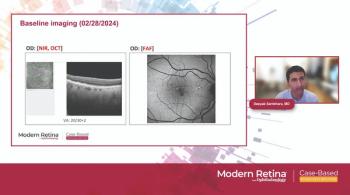
12-month data for OTX-TKI shows positive results for treatment of wet AMD
The 12-month data demonstrated maintenance of controlled wet AMD subjects comparable to aflibercept injections every eight weeks with a single administration of OTX-TKI.
Ocular Therapeutix, Inc. shared 12-month data from its Phase 1 U.S. clinical trial evaluating OTX-TKI over the weekend at the Clinical Trials at the Summit 2023 Meeting in Park City, Utah. This trial evaluated the axitinib intravitreal hydrogel implant for the treatment of wet age-related macular degeneration (wet AMD). OTX-TKI is also being developed for the treatment of diabetic retinopathy and other retinal diseases.
The data was presented by Arshad M. Khanani, MD, MA, principal investigator on the trial and Director of Clinical Research at Sierra Eye Associates. The presentation can be accessed by visiting the scientific and medical presentations tab of the investor section of the Company’s website at
An investigational, bioresorbable hydrogel intravitreal implant, OTX-TKI is designed to continuously deliver a potent tyrosine kinase inhibitor, axitinib, for the treatment of wet AMD and other VEGF-mediated retinal diseases. The 12-month data demonstrated maintenance of controlled wet AMD subjects comparable to aflibercept injections every eight weeks with a single administration of OTX-TKI. Four subjects received rescue therapy for the first time at Month 12, indicating the waning of OTX-TKI’s therapeutic effect and potential disease reactivation, which helps establish a re-dosing timeline for patients. No serious drug-related ocular or systemic adverse events have been observed in the trial.
“We are very pleased to see the durability in the 12-month OTX-TKI data in previously treated patients with wet AMD,” said Antony Mattessich, President and Chief Executive Officer of Ocular Therapeutix. “Pharmacodynamic effects observed in this trial support the characteristics of a treatment for wet AMD with durability between 9 to 12 months with a single injection. Following discussions with the FDA, we have two potential pivotal designs and are prepared to initiate a first pivotal trial for OTX-TKI in wet AMD as early as the third quarter of this year. We are excited for what these data could mean for patients living with VEGF-mediated retinal diseases.”
Summary of 12-Month Topline Data from U.S. Phase 1 Clinical Trial Evaluating OTX-TKI for Treatment of Wet AMD
The U.S.-based Phase 1 clinical trial is a prospective, multi-center, randomized, controlled study in subjects previously treated with anti-VEGF therapy that is evaluating a 600 μg dose of OTX-TKI in a single implant, with a 2 mg aflibercept injection four weeks after the implant, compared to 2 mg aflibercept injections administered every 8 weeks. The trial is designed to assess the safety, durability and tolerability of OTX-TKI, and to assess biological activity in subjects by measuring best corrected visual acuity (BCVA) and central subfield thickness (CSFT) of the retina.
The clinical trial enrolled a total of 21 subjects at six clinical sites in the United States, who were randomized 3:1 to an arm receiving a single OTX-TKI implant, with a 2 mg aflibercept injection four weeks after implant injection, and an arm receiving aflibercept injections every 8 weeks. One subject in the OTX-TKI arm was not treated per protocol and has been removed from the efficacy analysis, as the subject incorrectly received aflibercept instead of a sham injection at Month 3 and 5 visits.
As of the data cutoff of April 14, 2023, there were no drug-related ocular or systemic serious adverse events (SAEs) observed in the OTX-TKI arm. As the Company previously announced at the 10-month data readout, one SAE of endophthalmitis was observed in the OTK-TKI arm, which occurred following the mandated aflibercept injection at Month 1 and was assessed by the investigator as related to the injection procedure. There were no retinal detachment, retinal vasculitis, or implant migration into the anterior chamber adverse events observed in the OTX-TKI arm, and no subjects had dropped out of either arm as of the data cutoff.
The results showed subjects treated with a single OTX-TKI implant continued to demonstrate sustained BCVA (mean change from baseline of -1.0 letters) and CSFT (mean change from baseline of +20.2 μm) in the OTX-TKI arm at 12 months, which was comparable with the aflibercept arm (mean change from BCVA baseline of +2.0 letters; mean change from CSFT baseline of -2.2 μm). 60% of OTX-TKI subjects were rescue-free up to Month 12. At the Month 12 visit, an additional four of the subjects were rescued. Overall, an 89% reduction in treatment burden was observed in OTX-TKI treated subjects at 12 months.
“We are encouraged by the 12-month data as the performance of the OTX-TKI drug product continued to demonstrate that the implant bioresorbs at an average of about eight to nine months with axitinib remaining longer in the eye, potentially providing a window to re-dose patients before disease reactivation starts,” said Rabia Gurses Ozden, MD, Chief Medical Officer of Ocular Therapeutix.
Dr. Khanani said: “We saw an 89% overall reduction in treatment burden in patients treated with OTX-TKI. Approximately 73% of patients either required no or only one supplemental anti-VEGF injection through Month 12, which is clinically meaningful and highlights the possibility of OTX-TKI being widely adopted in the management of wet AMD.”
The Company is prepared to initiate a pivotal trial in wet AMD as early as the third quarter of 2023, subject to obtaining the necessary financing, which could be provided through a strategic alliance. OTX-TKI is also being evaluated in other retinal diseases. The Company recently completed enrollment of the Phase 1 HELIOS clinical trial to evaluate OTX-TKI for the treatment of diabetic retinopathy and 6-month interim results are expected in the first quarter of 2024.
Reference:
Ocular Therapeutix™ Announces 12-Month Topline Data from Ongoing U.S.-Based Phase 1 Clinical Trial Evaluating OTX-TKI for Treatment of Wet AMD. Press release. Ocular Therapeutix Inc., June 10 2023. Accessed June 12, 2023. https://www.globenewswire.com/news-release/2023/06/10/2685891/0/en/Ocular-Therapeutix-Announces-12-Month-Topline-Data-from-Ongoing-U-S-Based-Phase-1-Clinical-Trial-Evaluating-OTX-TKI-for-Treatment-of-Wet-AMD.html
Newsletter
Keep your retina practice on the forefront—subscribe for expert analysis and emerging trends in retinal disease management.








































